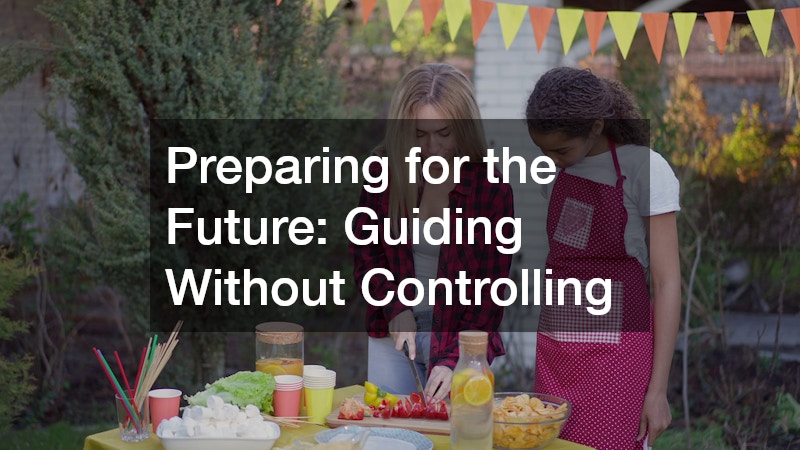Parenting a teenager can feel like navigating a maze without a map. Just when you think you understand their world, they take a new turn — closing their door, changing their interests, or pushing boundaries you never expected. Many parents find themselves asking how they can bridge the growing gap between them and their teens. While it’s natural for adolescents to seek independence, it’s also the period when they need connection, trust, and understanding the most.
When teenager trouble arises, it often reflects deeper needs — a desire for autonomy, identity exploration, or emotional release. Building communication and trust during this critical stage isn’t about control; it’s about creating a relationship grounded in empathy, consistency, and shared respect. From learning new skills together to seeking support when challenges arise, there are meaningful ways to reconnect and guide your teen toward healthy growth.
Understanding the Roots of Teenager Trouble
Before solving teenager trouble, it’s important to recognize where it comes from. Adolescence is a stage defined by rapid change — physical, emotional, and cognitive. Teens experience hormonal shifts, growing social pressures, and the need to carve out their own identity. Combine that with academic expectations and digital distractions, and it’s easy to see why miscommunication can flourish.
At the heart of many conflicts lies a battle for control. Teens often feel misunderstood when parents emphasize authority over empathy. For example, disagreements about curfews or friendships may not be about the rules themselves, but about wanting to feel trusted and respected. Building a foundation of communication means listening without judgment and offering guidance instead of directives.
Another layer of teenager trouble stems from internal struggles, such as adolescent stress. Between school demands, peer comparison, and uncertainty about the future, today’s teens face unique mental health challenges. Recognizing signs of overwhelm — irritability, withdrawal, or declining grades — can help parents intervene early. Encourage open conversations about coping tools, whether that means journaling, physical activity, or talking with a counselor.
To further ease tension, consider shared experiences that promote relaxation and connection. fishing excursion, for instance, creates quiet time for conversation and bonding without distractions. Nature’s calm can help teens open up, offering space to discuss worries without the pressure of a face-to-face talk at home. Ultimately, resolving teenager trouble requires understanding that conflict is not rebellion — it’s communication. When approached with patience and compassion, these moments become opportunities for growth rather than division.
Fostering Open Dialogue and Active Listening
Open dialogue is the backbone of trust. Without it, teenager trouble escalates, as misunderstandings multiply and emotional walls go up. Parents often assume they’re listening, but true listening means hearing beyond words — recognizing tone, body language, and emotional subtext. Teens need validation, not interrogation. Active listening begins with curiosity. Instead of offering immediate solutions, try responses like, “That sounds difficult. Tell me more.” This approach communicates respect and empathy, encouraging your teen to elaborate. Avoid jumping to conclusions or lecturing mid-conversation. When teens feel heard, they become more receptive to guidance.
Another way to enhance communication is through consistent routines that prioritize one-on-one time. Sharing weekly meals or setting aside tech-free evenings creates opportunities for natural conversation. Even small gestures — such as sitting together during a fishing excursion or attending events they enjoy — show commitment to understanding their world. To reinforce trust, transparency is key. Be honest about your own feelings, especially when setting boundaries. Phrases like, “I worry because I care” humanize your role, transforming rules into expressions of love rather than control.
Also, consider modeling openness about your own challenges. When parents admit mistakes or frustrations, it normalizes imperfection and encourages teens to do the same. This builds authenticity — an essential ingredient in dismantling teenager trouble. Remember that not every conversation has to be serious. Lighthearted interactions — discussing hobbies, trends, or Pokemon cards — remind your teen that communication can be enjoyable, not stressful. By blending emotional depth with casual connection, you create a safe, supportive environment where trust thrives.
Encouraging Healthy Outlets and Shared Activities
When teenager trouble surfaces, redirecting energy into constructive outlets can be transformative. Teens crave both structure and self-expression, and shared activities provide opportunities for connection beyond conflict. By engaging in hobbies together, parents and teens strengthen their bond while fostering mutual respect.
Physical activities, for instance, can serve as both stress relief and skill-building. local horse riding lessons offers more than just exercise; it teaches patience, responsibility, and empathy through the care of another living being. Horses respond to trust and calm energy — valuable lessons for teens learning emotional regulation. The experience can also act as a metaphor for communication: gentle guidance yields better results than force.
Similarly, attending local driving schools with your teen gives them a sense of independence while reinforcing accountability. It’s a practical milestone that symbolizes growing maturity. Sitting in on a few lessons or discussing driving etiquette can spark conversations about responsibility and trust. For teens with an affinity for strategy or competition, joining a local tennis academy nurtures discipline and focus. Sports environments teach teamwork and resilience, reminding teens that progress often comes through patience and persistence. Parents who attend matches or practice sessions demonstrate tangible support — a crucial factor in building confidence.
Even non-physical activities — from art and music to cooking or volunteer work — provide healthy emotional release. Shared projects remove the spotlight from conflict, allowing connection to grow organically. Over time, these moments accumulate into trust, turning teenager trouble into teachable experiences. Encouraging variety helps teens discover passions and strengths, laying the foundation for self-worth and independence. The goal isn’t perfection but presence — showing up consistently as a teammate in their journey toward adulthood.

Balancing Independence with Guidance
A major source of teenager trouble arises when autonomy clashes with parental authority. Adolescence is defined by the desire for independence, yet boundaries remain necessary for safety and growth. Finding equilibrium between freedom and structure is essential for nurturing trust. Start by involving your teen in decision-making. When they participate in setting curfews, study schedules, or household responsibilities, they develop ownership over the outcomes. Collaboration transforms rules into agreements — fostering accountability rather than defiance.
Academic pressure often complicates this dynamic. Teens may struggle to stay motivated or feel anxious about college preparation. Partnering with private SAT tutors can reduce stress while reinforcing teamwork between parent and child. Rather than imposing extra study sessions, involve your teen in choosing a tutor who fits their learning style. This empowers them to take initiative, easing resistance and promoting mutual respect. Similarly, encouraging exploration of local private high schools can offer teens environments aligned with their interests or values. Smaller class sizes, specialized programs, or mentorship opportunities may better suit their learning needs. Including your teen in school visits and discussions helps them feel heard, minimizing friction around academic choices.
Remember, autonomy doesn’t mean absence of guidance. Teens need clear expectations paired with the freedom to make manageable mistakes. A parent’s role evolves from director to coach — offering advice, sharing experiences, and stepping back when appropriate. Balance requires trust in your teen’s capabilities. Express belief in their judgment, even when they stumble. Confidence from parents becomes a mirror for self-assurance in adolescents. When they sense trust, teenager trouble shifts into collaboration, paving the way for growth and mutual understanding.
Supporting Emotional Well-Being and Stress Management
Modern adolescence is rife with pressure, making emotional health a cornerstone in resolving teenager trouble. Between academic demands, social dynamics, and future uncertainty, many teens quietly struggle with adolescent stress. Addressing these emotions early can prevent long-term challenges and foster resilience. Begin by normalizing conversations about mental health. Let your teen know that feeling overwhelmed, anxious, or sad doesn’t mean they’re broken — it means they’re human. Encourage self-awareness by asking reflective questions like, “What’s been on your mind lately?” or “What do you need more of right now?”
Introduce coping strategies tailored to their interests. Physical movement, like joining a local tennis academy or attending local horse riding lessons, channels stress into positive energy. Creative outlets — art, writing, music — allow teens to externalize feelings they may not yet have words for. Mindfulness practices such as deep breathing, journaling, or guided meditation also reduce tension and increase focus. Encourage balance by protecting downtime. Overscheduled teens often experience burnout, which can intensify teenager trouble.
Additionally, teach problem-solving rather than avoidance. When conflicts arise — with friends, school, or family — model calm communication. Demonstrate that challenges are opportunities to learn, not threats to identity. Parents should also monitor their own stress responses. Teens mirror the emotional climate of their homes. Maintaining composure during disagreements teaches emotional regulation through example. Finally, don’t hesitate to seek professional support. Counselors, therapists, or school psychologists can provide safe, neutral spaces for teens to process feelings. Collaboration with mental health professionals signals that caring for emotional well-being is a sign of strength, not shame.
By prioritizing emotional health, parents transform teenager trouble from a source of conflict into a catalyst for growth, empathy, and lasting resilience.
Cultivating Responsibility Through Real-World Learning
Adolescence is the bridge between dependence and adulthood. Teaching responsibility through hands-on experiences helps redirect teenager trouble into maturity. Real-world learning fosters accountability, discipline, and confidence — traits that build trust between parents and teens. Consider introducing opportunities that blend fun with responsibility. Participating in a sailboat charter excursion, for example, offers lessons in teamwork, navigation, and adaptability. On the water, teens quickly grasp how their actions affect the group’s success, reinforcing cause-and-effect thinking in an engaging setting.
Similarly, enrolling in local driving schools provides structured independence. Learning to drive demands focus, patience, and respect for safety — all crucial life skills. Parents can support by discussing road safety, encouraging consistent practice, and recognizing progress rather than perfection. For teens exploring creative or career-oriented passions, programs like cosmetology classes or workshops allow them to express individuality while mastering professional standards. The discipline required in beauty, design, or customer service roles translates into responsibility in other areas of life.
Responsibility also extends to financial awareness. Involve your teen in budgeting for hobbies, outings, or educational resources. Managing their own spending — even on collections like Pokemon cards — teaches value, restraint, and decision-making.
The key is balance: offering independence within safe parameters. When teens experience trust through responsibility, they internalize integrity rather than react to restriction. Over time, this empowerment diminishes teenager trouble, replacing conflict with cooperation. Ultimately, experiential learning bridges theory and reality. It shows teens that accountability isn’t punishment; it’s power — the ability to shape their own outcomes and earn respect through reliability.
Building Connection Through Shared Interests and Quality Time
In a world of screens and schedules, meaningful connection often takes deliberate effort. When teenager trouble emerges, shared interests become a lifeline back to understanding. Investing in activities that resonate with your teen’s passions shows that you value their individuality, not just their compliance.
Start by entering their world with curiosity. If your teen collects Pokémon cards, ask about their favorite characters or attend a local trading event together. These lighthearted exchanges signal that you care about what excites them. Over time, casual conversations can evolve into deeper discussions about goals, challenges, and emotions.
Explore experiences that combine adventure and relaxation. Booking a sailboat charter, for instance, encourages collaboration and communication in an unplugged environment. Working together to steer, navigate, or simply enjoy the view fosters teamwork and trust.
Sports and lessons — such as local horse riding lessons or training at a local tennis academy — also strengthen connection. Cheering from the sidelines or participating side-by-side reinforces emotional presence and shared purposes. Education-based activities, like touring local private high schools or consulting private SAT tutors, demonstrate partnership in academic growth. Approach these experiences as co-explorers rather than critics to reduce defensiveness.
Even simple routines, like evening walks or family dinners, create consistent spaces for conversation. The goal isn’t quantity but quality — showing up without distraction or judgment. When parents share genuine enthusiasm for their teen’s interests, they transform power struggles into partnerships. Over time, connection becomes the antidote to teenager trouble, restoring warmth and understanding that withstand life’s transitions.

Preparing for the Future: Guiding Without Controlling
As teens edge closer to adulthood, guiding them through future decisions becomes both rewarding and challenging. Many aspects of teenager trouble arise from uncertainty — fear of failure, pressure to perform, or resistance to imposed paths. Parents can ease this transition by shifting from authority figures to trusted advisors.
Help your teen explore future possibilities aligned with their passions. If they express interest in style, cosmetology courses can introduce practical career pathways. For academically driven teens, collaboration with private SAT tutors supports goal-setting and confidence-building.
Beyond academics, emphasize life skills — financial literacy, time management, and emotional intelligence. Encourage part-time jobs, volunteer roles, or internships that provide exposure to responsibility without overwhelming them.
To build self-efficacy, celebrate effort over outcome. When teens see that persistence matters more than perfection, they develop resilience that mitigates teenager trouble. Mistakes become lessons rather than failures. Equally important is maintaining open dialogue about challenges. Ask questions like, “What excites you most about your future?” or “What worries you?” Listen without imposing your own expectations. Teens value autonomy, and honoring their input fosters mutual respect.
Finally, remind your teen that growth is a journey, not a race. Encourage balance by integrating relaxation — whether it’s a fishing excursion, sailboat charter, or simple downtime at home. Rest is not laziness; it’s restoration. By guiding with empathy and flexibility, parents empower teens to make informed, confident choices. This partnership turns potential teenager trouble into a shared adventure toward independence and success.
Turning Trouble into Trust
Parenting through teenager trouble requires patience, empathy, and adaptability. It’s a season of transformation — for both teens and parents — filled with opportunities to deepen understanding and strengthen bonds. When communication becomes a dialogue rather than a directive, and when guidance evolves into mentorship, trust naturally follows. The teenage years don’t have to be defined by friction. With intentional effort and heartfelt understanding, parents can replace teenager trouble with trust — laying the foundation for lifelong connection, respect, and confidence.






